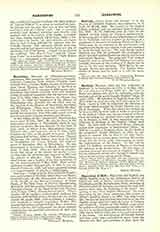

Harrowing of Hell. — This is the Old English and Middle English term for the triumphant descent of Christ into hell (or Hades) between the time of His Crucifixion and His Resurrection, when, according to Christian belief, He brought salvation to the souls held captive there since the beginning of the world. According to the “New English Dictionary” the word Harrowing in the above connection first occurs in Aelfrie’s homilies, about A.D. 1000; but, long before this, the descent into hell had been related in the Old English poems connected with the name of Caedmon and Cynewulf. Writers of Old English prose homilies and lives of saints continually employ the subject, but it is in medieval English literature that it is most fully found, both in prose and verse, and particularly in the drama. Art and literature all through Europe had from early times embodied in many forms the Descent into Hell, and specimens of plays upon this theme in various European literatures still exist, but it is in Middle English dramatic literature that we find the fullest and most dramatic development of the subject. The earliest specimen extant of the English religious drama is upon the Harrowing of Hell, and the four great cycles of English mystery plays each devote to it a separate scene. It is found also in the ancient Cornish plays. These medieval versions of the story, while ultimately based upon the New Testament and the Fathers, have yet, in their details, been found to proceed from the apocryphal Gospel of Nicodemus, the literary form of a part of which is said to date back to the second or third century. In its Latin form this “gospel” was known in England from a very early time; Bede and other Old English writers are said to show intimate acquaintance with it. English translations were made of it in the Middle Ages, and in the long Middle English poem known as “Cursor Mundi” a paraphrase of it is found.
K. M. WARREN

